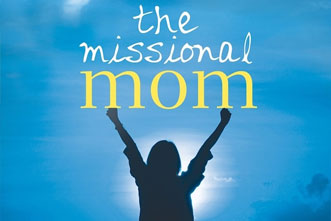In the midst of the movement toward building missional church communities, it is crucial to encourage our families to develop missional mindsets. Joining the mission of Jesus Christ in the world around us is profoundly shaped by the faith we practice at home.
We caught up with Helen Lee, former assistant editor at Christianity Today, to ask her some questions about her recent book, The Missional Mom: Living with Purpose at Home & in the World. While The Missional Mom is written for mothers, its principles speak deeply to the heart of all parents who want to raise their families missionally.
ChurchLeaders: What was the catalyst for writing The Missional Mom?
Helen: The initial catalyst was becoming a mother myself! I had wanted to write a book about motherhood in part to help myself understand my own struggles and challenges with the transition to parenting. But I wasn’t quite sure how to get at the topic until I began to learn about the missional church when I was asked to do an article in 2008 for Leadership Journal (“Missional Shift or Drift?”). I had not known much about the missional church until that point, but once I started understanding more about the general concept, the more I was excited by what I was learning.
Then I found myself wondering, did mothers who are living missionally have a better handle on the questions of identity and calling than I did? Did these moms have a different experience of motherhood than I did? I interviewed about 40 different women who were all living missionally in some way or another. They were all women who deeply valued their roles as moms and wives, but they also lived with intentionality and a strong sense of following a God-given mission. And what I discovered is that these moms had a deep sense of fulfillment and peace about their lives that spilled over into how they viewed motherhood. Motherhood fit into the overall calling and purpose that God had for their lives. So it was incredibly fun and inspiring to write about these women.
CL: How much do you think the “SuperMom” myth has affected Christian mothers?
Helen: I think the “SuperMom” myth has affected all mothers! We are under a great deal of pressure and stress from the surrounding culture to produce perfect, well-bred, multi-talented, brilliant children, and many Christian mothers (and fathers!) have bought into the success narrative that drives so many of today’s American families: being a great parent means that you work hard so that you can live in a nice neighborhood with great schools, get your children involved in every activity under the sun so that they can go to a great college then get a great job, so that the whole cycle can perpetuate itself. It’s the allure of the American Dream and all it represents. And it’s such an utter fallacy for us to follow.
CL: In your book, you are realistic about the difficulties moms face but also hopeful about the possibility of positive change. How do you think missional living can help moms find freedom and peace in their everyday lives?
Helen: What I’ve discovered through interviewing numerous “missional moms” is that when you live with a primary calling of seeking after God’s mission first and foremost, understanding that motherhood is one of our secondary callings through which to live out that first calling, it puts your life into the proper perspective. You were designed by God to use your gifts and abilities for his glory and to further his Kingdom; motherhood is a critical context through which we do so but by no means the only one. When mothers understand this, they experience so much passion and fulfillment as a result. This has been a transformative concept in my life, and whenever I talk to moms who have read the book, they tell me this is a transformative concept in their lives as well.
CL: Can you briefly describe what Third Culture means? Why is becoming Third Culture so important for moms who want to live missionally?
Helen: The “third-culture” concept is one I picked up from Newsong Church pastor Dave Gibbons in his book The Monkey and the Fish. Essentially, the third-culture mentality is one that continually looks for ways to build bridges and relationships with those who are different from us in some way – racially or socioeconomically, for example – as a way to demonstrate the power of God’s love to bring people together.
I think this is actually a piece of the missional conversation that has not emerged quite as prominently. I believe the church has an incredible opportunity to demonstrate what reconciliation is all about if we could just start embracing the third-culture mentality in our own lives. Doing so requires we are willing to take risks, step out of our comfort zones, and pursue relationships with those who may make us uncomfortable. But what better witness to the world than to show that the love of Christ has the power to reconcile even the widest chasms between people? I’d love to see more people talking about the race piece in conversations about being missional.












